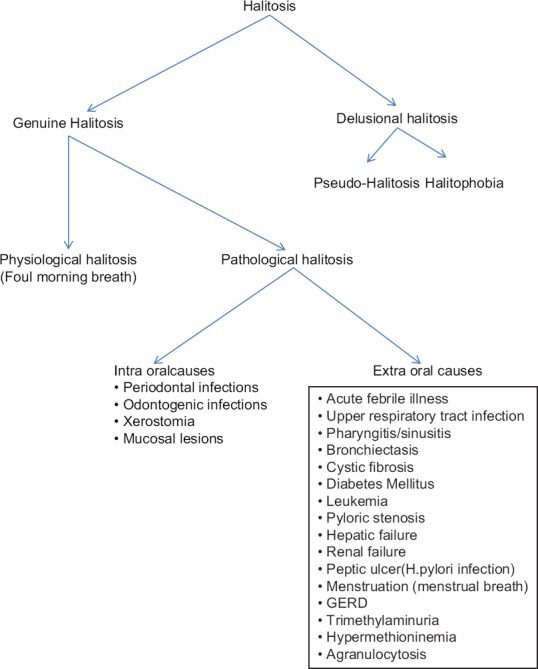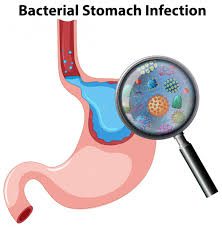Bad breath problem is an embarrassing medical condition which is experienced by almost each and everyone at some point in their life.
Medically known as halitosis, bad breath is a prevalent concern among individuals seeking help from healthcare professionals.
Despite being a significant issue this bad breath problem or the subject of oral malodor has often been neglected by everyone.
Up to 50 percent of the population reports that their own “bad breath problem” has concerned them during some point in the course of their lifetime.
This article aims to provide an understanding of this bad breath problem,and how you can manage it.
Table of Contents
Prevalence of Bad breath
In the general population, halitosis has a prevalence ranging from 50% in the USA (Courtesy ) to between 6% and 23% in China (Courtesy), and another study had revealed a prevalence of self-reported halitosis among Indian dental students ranging from 21.7% in males to 35.3% in females. (Courtesy)

Types of Bad breath Problem
According to the European Journal of Dentistry Bad breath can be classified into two categories:
- Genuine Halitosis and
- Delusional Halitosis.

Causes of Bad mouth odour
Physiological malodour which is also referred to as “morning breath,” is caused by the accumulation of bacteria on the surface of tongue at night due to decreased saliva flow and the presence of food particles in the mouth.
Dental diseases account for 80-85% of bad breath problem with gum infections being a common cause. Other intraoral causes include tooth infections, mucosal lesions, and mouth ulcers.

Additionally, certain foods, tobacco, alcohol, and betel nut consumption can contribute to transient oral malodor.
Apart from causes due to the mouth other factors can also contribute to the problem of bad breath.
These include conditions originating from the ears, nose, and throat (ENT) region, such as tonsillitis, tonsilloliths, foreign bodies in the nose, and pus discharge from the sinuses.
Stomach issues causes, such as gastroesophageal reflux disease (GERD), and gastric ulcers, can also lead to bad breath problem.

Furthermore, certain metabolic, systemic, and endocrinological diseases, as well as the use of specific medications, have been associated with foul breath .
Specific diseases have characteristic odours as mentioned in the table below
| Serial Number | Disease | Characteristic Odor |
|---|---|---|
| 1 | Diabetes mellitus | Fruity or Acetone smelling breath |
| 2 | Liver insufficiency | Smell of dead mice (breath of death) |
| 3 | Trisomy | Smell of Cabbage |
| 4 | Kidney insufficiency, trimethylaminuria | Fish odour |
| 5 | Uremia, kidney failure | Ammonia or urine-like |
| 6 | Maple syrup urine disease | Burned sugar smell |
| 7 | Homocystinuria | Sweet musty smell |
| 8 | Isovalerian acidemia | Sweating feet smell |
| 9 | Lung abscess or bronchiectasis | Odorous rotten meat smell |
| 10 | Putrefaction of pancreatic juices | Hunger breath smell |
| 11 | Portocaval venous anastomosis | Feculent amine smell resembling a fresh cadaver |
| 12 | Blood dyscrasias | Resembling decomposed blood of a healing surgical wound |
| 13 | Liver cirrhosis | Smell Resembling decayed wound |
| 14 | Wegener’s granulomatosis | Necrotic putrefactive |
| 15 | Syphilis, exanthematous disease, granuloma venerum | Fetid |
| 16 | Azotemia | Ammonia-like |
Delusional Halitosis
Delusional halitosis, also known as imaginary halitosis, is a condition where individuals believe their breath odor is offensive, causing social distress.

However, despite their concerns, no clinician or confidant can confirm the existence of this problem. Interestingly, advertisements of oral hygiene products are responsible for the increase in a number of patients with delusional halitosis.
Pseudo-halitosis is another phenomenon where patients complain of oral malodor despite not actually experiencing bad breath and eventually gets convinced of being free of this problem when told by a doctor.
Halitophobia is a fear of having bad breath problem and such patients need psychological counseling.

Olfactory Reference Syndrome, where individuals have preconceived notions about emitting offensive body odors, are other psychological disorders associated with halitosis.
Treatment Remedies for Bad breath
Here are a few remedies suggested by top experts which will help in the management and treatment of this embarassing problem.
Good Oral Hygiene:
Brushing your teeth at least twice a day with fluoride toothpaste helps remove plaque, food particles, and bacteria that can cause bad breath.
It’s important to brush all tooth surfaces, including the gumline, and replace your toothbrush every three to four months.
Tongue Cleaning:
Bacteria can accumulate on the surface of the tongue, leading to bad breath.
Using a tongue scraper or a toothbrush, gently clean the tongue from back to front to remove the buildup of bacteria and debris.
This practice helps reduce the source of foul-smelling compounds.
Regular Dental Check-ups:
Scheduling regular dental check-ups allows your dentist to examine your oral health, identify any dental issues contributing to bad breath (such as gum disease or tooth decay), and provide appropriate treatment.
Professional cleanings can also remove stubborn plaque and tartar.
Drink Water and Stay Hydrated:
Drinking an adequate amount of water throughout the day helps prevent dry mouth, which can contribute to bad breath. The key is to drink water every hour so that the mouth does not dry.
Water stimulates saliva production, which naturally cleanses the mouth and helps wash away bacteria and food particles.
Avoid Tobacco and Alcohol:
Tobacco products and excessive alcohol consumption can contribute to bad breath.
Quitting smoking and limiting alcohol intake not only improve overall health but also reduce the risk of developing oral health problems that can cause bad breath.
Watch Your Diet:
Certain foods, such as onions, garlic, spices, and heavily seasoned dishes, contain volatile compounds that can cause bad breath.
While avoiding these foods entirely may be challenging, practicing thorough oral hygiene afterward, including brushing and flossing, can help minimize the lingering odor.
Use Mouthwash:
Antiseptic mouthwashes can temporarily freshen breath by killing bacteria in the mouth.
Look for mouthwashes that contain ingredients like cetylpyridinium chloride, or essential oils like menthol or eucalyptol.
However, it’s important to note that mouthwash is not a substitute for brushing, flossing, and maintaining good oral hygiene.
Address Underlying Health Conditions:
If bad breath persists despite practicing good oral hygiene, it may indicate an underlying health condition.
Conditions such as chronic sinus infections, respiratory tract infections, gastrointestinal issues, or systemic diseases can contribute to bad breath.
Seeking professional dental or medical advice will help identify and address these underlying causes.
Remember, these are general guidelines for managing bad breath. It’s essential to personalize your oral hygiene routine and seek professional advice when necessary to address any specific concerns or underlying conditions that may be contributing to persistent bad breath.
To read which is the best option to replace missing teeth-implants or fixed partial dentures Click below
To know about Dental Insurance Click below

I was suggested this blog by my cousin. I am not sure whether this post
is written by him as no one else know such detailed about
my trouble. You’re wonderful! Thanks!